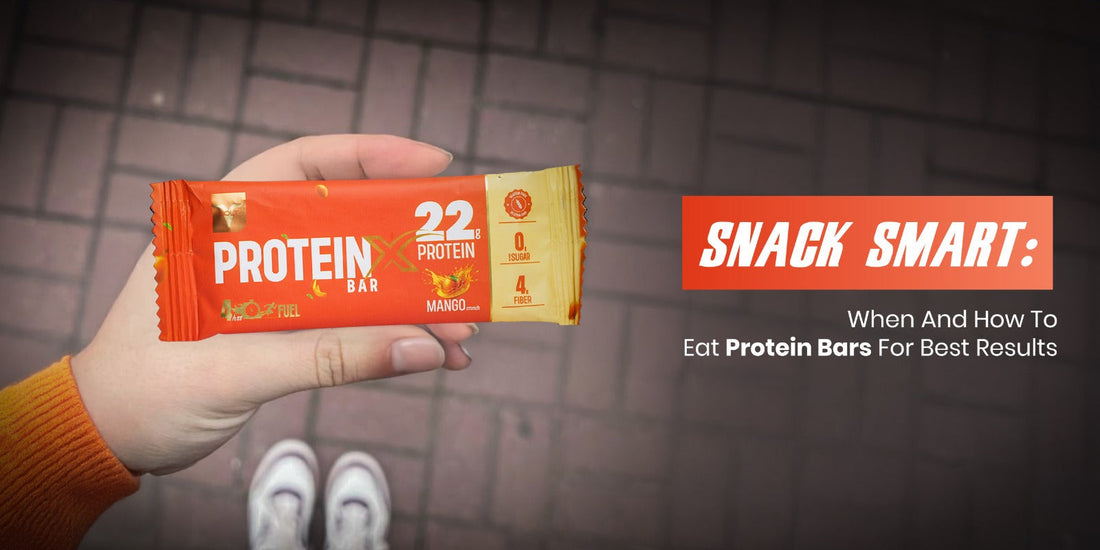
Snack Smart: When and How to Eat Protein Bars for the Best Results
byIn the current fast-paced environment, protein bars have emerged as the preferred snack for fitness aficionados, busy professionals, and individuals striving to maintain a healthy lifestyle while on the move. But to truly maximize the benefits of a protein bar, you need to know when and how to eat it. In this blog, we’ll break down the best times to eat protein bars, how to choose the right one, and how it fits into your fitness and wellness goals.
What Are Protein Bars?
Protein bars are snacks rich in nutrients, designed to provide a substantial amount of protein, frequently accompanied by carbohydrates, fiber, vitamins, and beneficial fats. They’re a convenient alternative to whole food protein sources like eggs, meat, or shakes — perfect for people with active lifestyles or tight schedules.
When Should You Eat a Protein Bar?
Understanding the optimal timing for consuming your protein bar can greatly impact the attainment of your health objectives:
1. Post-Workout (Best for Muscle Recovery)
After a tough workout, your muscles crave protein to repair and rebuild. A protein bar within 30 minutes of exercise can kickstart muscle recovery, replenish glycogen stores, and reduce muscle soreness.
2. Pre-Workout (Fuel Your Session)
Need an energy boost before training? Select a protein bar containing a moderate amount of carbohydrates approximately 30 to 60 minutes prior to your exercise session. It provides sustained energy and prevents muscle breakdown during intense training.
3. Meal Replacement (On-the-Go Option)
Pressed for time? A high-protein, high-fiber bar can be a great temporary meal replacement. Seek out bars that contain a minimum of 15–20g of protein, along with complex carbohydrates and healthy fats to promote feelings of fullness.
4. Midday Craving Buster
Swap your sugary snacks for a protein bar around 3–4 PM. It keeps blood sugar stable, prevents energy crashes, and reduces overeating later in the evening.
5. Late-Night Craving Control
Trying to avoid junk food before bed? A low-carb, low-sugar protein bar can curb your cravings and keep your metabolism from slowing down overnight.
How to Choose the Right Protein Bar
All protein bars are not created equal. Here’s what to look for:
|
Criteria |
Ideal Range |
|
Protein Content |
15–25g per bar |
|
Sugar |
Less than 5–8g |
|
Calories |
200–300 (depending on your goals) |
|
Ingredients |
Whole foods, no artificial junk |
|
Fiber |
3–10g for digestive health |
Choose bars that are low in sugar alcohols, free from trans fats, and contain whey, pea, or casein protein for muscle support.
Who Should Eat Protein Bars?
Protein bars are suitable for:
- Athletes and gym-goers (muscle recovery & endurance)
- Busy professionals (quick, healthy snack option)
- Weight watchers (craving control & satiety)
- Vegetarians/Vegans (plant-based options available)
- Students and travelers (portable, no-prep nutrition)
How Protein Bars Help You Achieve Results
Whether your goal is muscle gain, fat loss, or simply eating clean, protein bars help by:
- Supporting muscle repair & growth
- Controlling hunger & cravings
- Helping maintain lean muscle mass while dieting
- Keeping you energized & focused
Pro Tips to Snack Smart
- Don’t rely only on protein bars — they’re supplements, not substitutes.
- Consume an adequate amount of water alongside your bar to aid in digestion.
- Pair your bar with a piece of fruit or black coffee for an energizing combo.
- Steer clear of bars that contain high levels of sugar or artificial additives — it is essential to always check the label. Buy Protein Bars Online, Best Time to Eat Protein Bars
Conclusion
Protein bars are more than just trendy snacks — they’re powerful tools when used smartly. Whether you're chasing gains at the gym or simply trying to eat better during your hectic workday, knowing when and how to eat protein bars makes all the difference.
Looking to understand more about the benefits of protein bars? Check out this detailed guide by Healthline to explore how protein bars can support your fitness goals and daily nutrition.
FAQs:
Q1. When is the best time to eat a protein bar?
You can eat a protein bar post-workout (to aid muscle recovery), pre-workout (30-60 minutes before to fuel your session), as a meal replacement when you’re busy, or as a mid-afternoon snack or late-night craving-buster.
Q2. What should I look for when choosing a protein bar?
Choose a bar that has about 15-25 g protein, less than ~5-8 g sugar, around 200-300 calories, includes fiber (3-10 g), and uses clean ingredients like whey, pea or casein protein rather than lots of artificial additives.
Q3. Can protein bars replace regular meals?
They can be used as a convenient replacement when in a rush, provided they offer sufficient protein, fiber, and healthy carbs/fats — but they shouldn’t completely replace whole-food balanced meals regularly.
Q4. Are protein bars only for gym-goers and athletes?
No — while they’re ideal for athletes and gym-goers (for muscle repair and endurance), they also work well for busy professionals, students, travellers, and anyone needing a portable high-protein snack that helps control cravings.
Q5. What are some smart tips when snacking on protein bars?
Smart tips include: don’t rely solely on protein bars (they’re supplements, not complete meals), drink water with them to aid digestion, pair with a piece of fruit or black coffee for a better combo, and always check the label for added sugar or low-quality ingredients.







